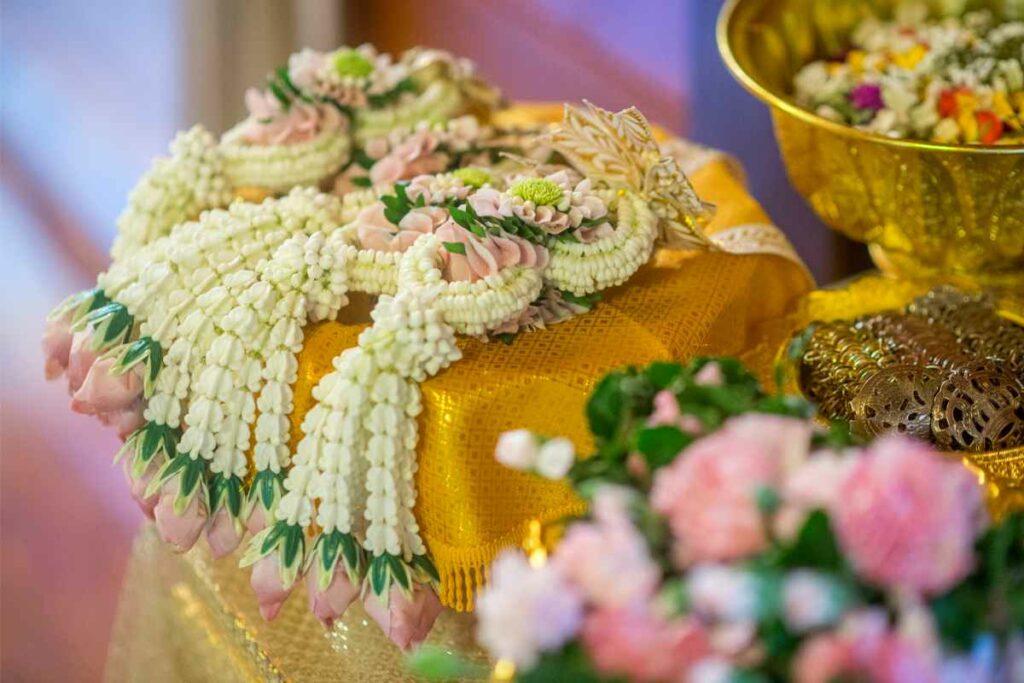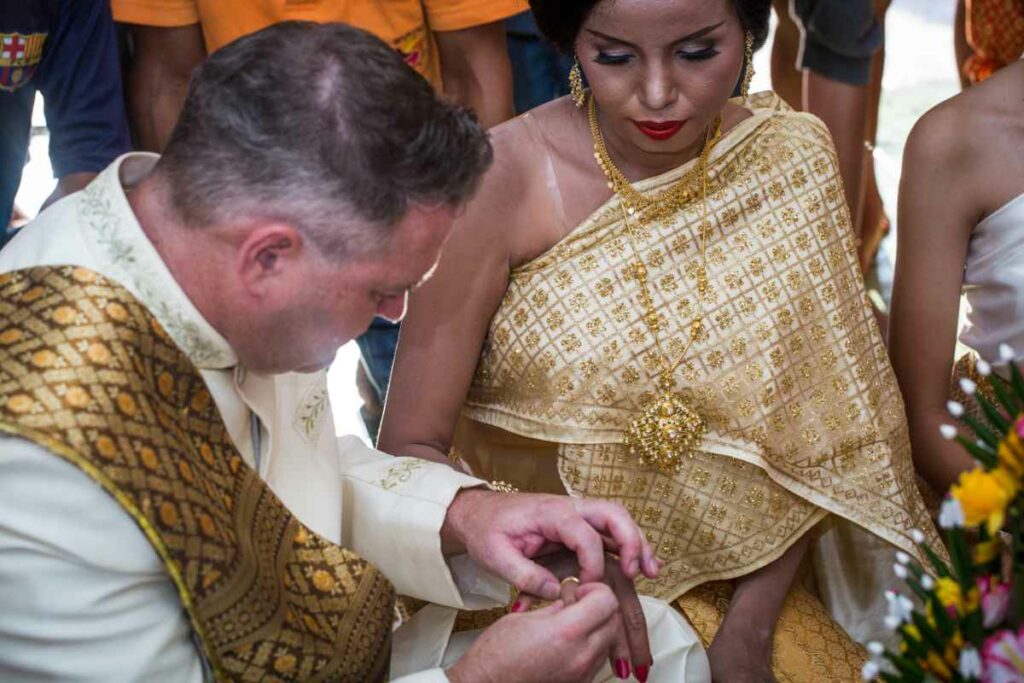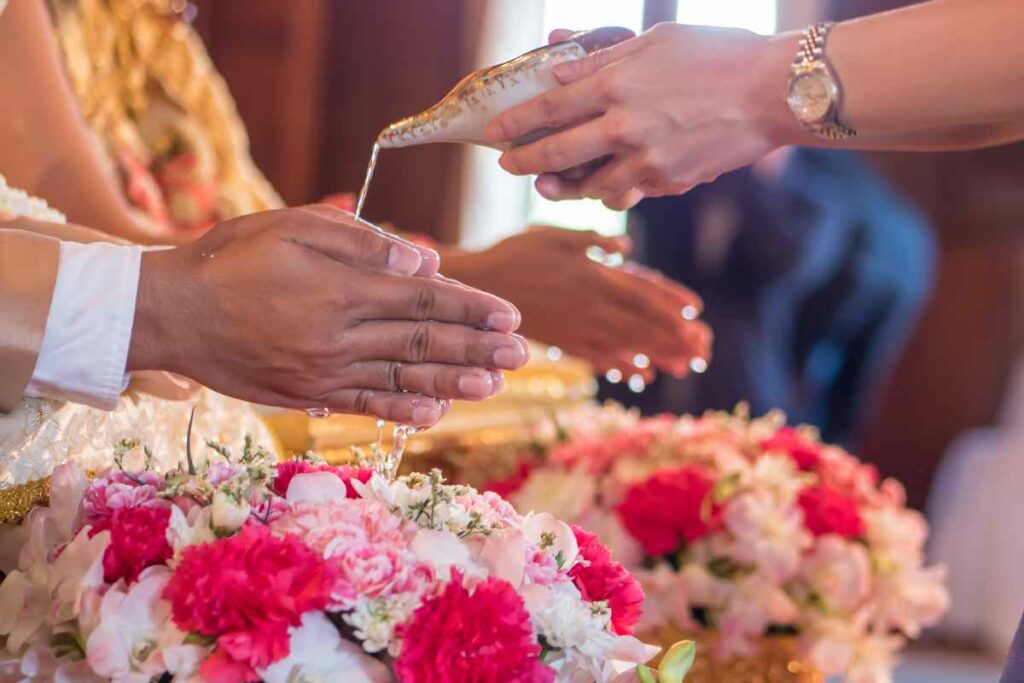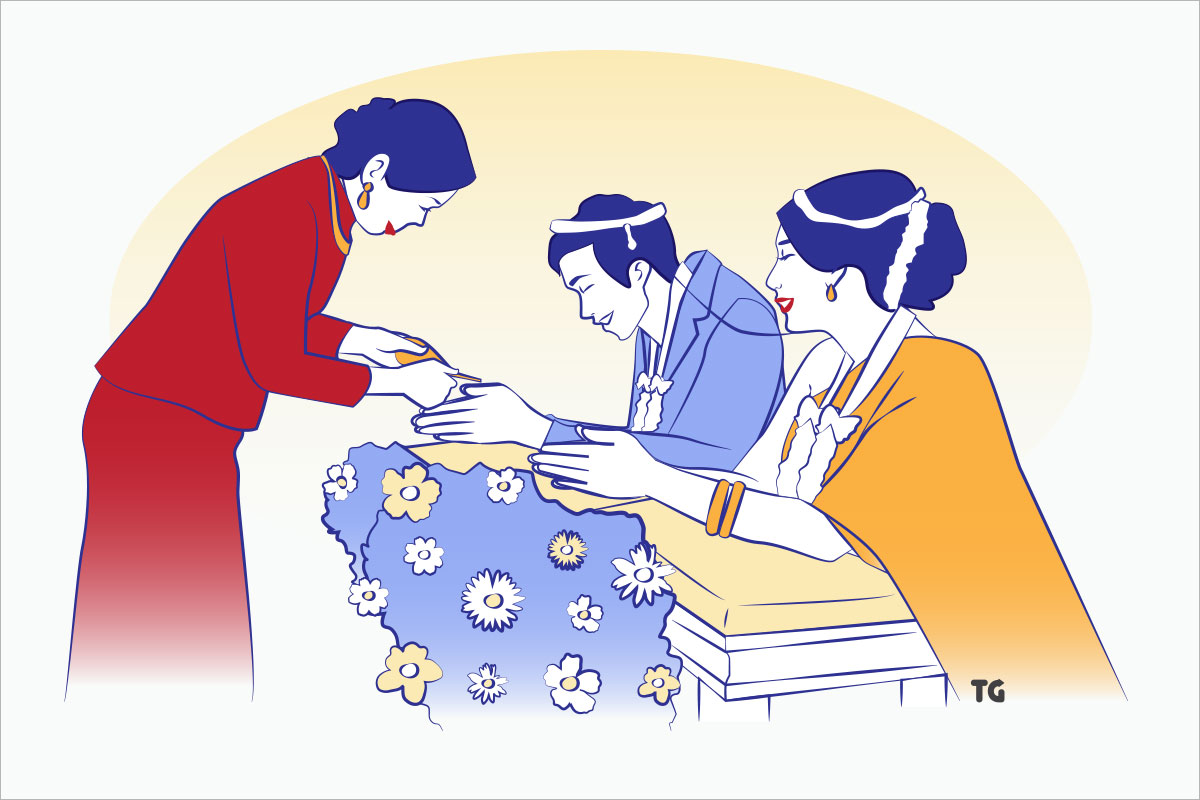If you’re an ex-pat in Thailand, you might get to marry a Thai person. But as you probably know, Thai wedding ceremonies differ from the West. The question is, “Do you know what Thai wedding tradition is like and how to organize one?”
Thai weddings come in many variations. The determining factor is the budget of the couple. For the wealthy, the ceremony can take place on multiple days — separating the engagement and wedding ritual. The middle class’s ceremonies usually wrap up in one day — cramming everything to save money.
Of course, finance is not the only element dictating your wedding. There’s also astrology, religion, and other traditions to think about. So, read on and discover what “tying the knot” in Thailand looks like.
What is a traditional Thai wedding ceremony like?

Typically, traditional Thai weddings are everything but minimal. You must think about many things when organizing one — from entertainment to religion and superstition.
To make it easier to understand, you can divide a Thai wedding into 4 phases: the monk’s phase, the engagement phase, the wedding phase, and the party phase.
Phase 1: The monk phase
This phase is actually not a part of the wedding itself, but more of a preface.
Thai people love to kick every ceremony off with a touch of Buddhism. And weddings are no exception.
On the engagement day morning, the couple and their family usually organize a feast for local monks. They believe doing so would bless their marriage with longevity, abundance, and happiness.
How much food do you want to make? This depends on your budget. But usually, the locals would cook for 9 monks. But why nine?
This is where the superstitious side of the wedding appears. 9 is considered a fortune number in Thailand. It’s pronounced, “Kao.” And it rhymes with the word for “moving forward.” So holding a feast for 9 monks symbolizes moving into the next stage of life.
And besides, you can look at this feast as part of the “payment” for the monks. You will need their help in later phases, so offering them food in advance is like preparing them for future work.
Phase 2: The engagement ritual
As mentioned, money is a big deal in Thai weddings. And this phase reflects that value well.
In the late morning or at noon, after the monk phase, the groom would form a parade with his friends and relatives — carrying fortunes like money, gold, jewels, and even banana trees. Then, they march to the bride’s house. This parade is called “Khan Mak.”
And when there’s a parade, there will be music, dances, and smiles. The music here is usually played on a speaker, and the song played is a special tune for this occasion. It’s designed to announce that the “Khan Mak” has arrived.
Along the way, the parade will meet with the bride’s family members blocking the way. The groom needs to pay them money to open up, so he can move on. This blockage can occur multiple times. How many times? It depends on the whims of the bride’s family. But it’s usually three.
Once inside the bride’s house, the parents from both sides would talk to each other. They will discuss the “Sin sod.” This term refers to the amount of money and valuables the groom gives the bride’s parents in exchange for her.
In the wrong light, these money-related actions could be seen as “paying your way to marriage” or “purchasing a wife.” But it actually has a meaning to it.
All the payment made in this phase is to prove that the groom is capable of putting food on the table as a family leader. Moreover, it shows that he’s willing to go all out (financially) for the woman he loves. In short, it reflects his dedication to his future wife.
After the discussion, the groom gives the bride’s parents the money. Then, he put an engagement ring on her finger.
The thing is, when receiving the ring, the bride has to prostrate to the groom. This action symbolizes her thanking him for making her his bride. This might offend many feminists. But please remember that Thailand and patriarchy go way back. And this prostration is a reflection of such a history.
Then the bride and the groom will prostrate to the parents. The parents, in turn, bless their marriage with fortune and happiness.
Phase 3: The wedding phase
After the engagement, the wedding phase could take place in the afternoon. But if you feel extra fancy, you could hold the wedding on a different day.
But regardless of when, you still need to go through the same ritual. And it’s called “the conch shower.”
The “conch” in this context means a literal conch. The relatives and VIP guests would come up to the couples, put water in the conch, and pour it down on the couple’s hand. They also verbally bless the husband and wife in their marriage.
The conch is believed to be a sacred object in Hinduism. It is one of the four objects Brahma holds in his four hands. Water from the conch is said to cleanse impurities from the body and soul.
As the attendees queue up to perform the conch shower, the monk will chant the wedding sutras in the background. However, the atmosphere might be more lively than solemn during this time. Everybody would smile and congratulate the couple.
When every relative has made their turn, it’s time for the “bedroom” part.
This is where the parents from both sides escort the newlywed to their bedroom. They will leave the husband and wife in the room for a couple of moments, letting them “do the deed.”
In the old days, this “bedroom” part happened in the evening. The couple will spend the night together, doing what couples do in bed. But nowadays, it takes place in the afternoon to shorten the ceremony. Or else, all the guests have to wait till night for the ceremony to finish.
And that marks the end of the wedding ceremony. Next is party time.
Phase 4: The party phase
This phase is not traditional by any means. But everyone loves to party on such a celebratory day. So, the modern wedding usually has this phase in the late afternoon or evening.
The bride and groom can design the party however they like. It’s completely open-ended.
You can have a dinner party with karaoke, a dance party with light and music, or even a casual meal in the garden.
Typically, the party is held to thank all the guests for attending. There should at least be food for everyone to enjoy.
You can go with any food: Thai, western, Chinese, Indian, you name it. However, keep in mind that the age range of the attendees is wide, so prepare at least one dish for the elder’s taste.
The party usually ends before midnight since it exceeds the elder’s and children’s bedtime. But if you want to hold an after-party with friends, go ahead.
▸ READ MORE about ▸ Thai Traditions
How much does a Thai wedding cost?

This question can be tricky. Why? Because it depends on you and your partner’s preference.
You could go for a low-budget small-scale ritual or a grand-size high-value ceremony. The important thing is you need to talk it out with all sides beforehand. And by all sides, it means much more than just your partner.
For example, if you are a man. You need to discuss the budget for the wedding with your future wife, your parents, your bride’s parents, and other relatives.
You cannot decide on the wedding with just you and your partner. Consider the wealth and fame of both families too.
Some Thai families can be picky when it comes to wedding sizes. Since they are a big family with a massive reputation in the area, they want everyone they know to attend your wedding. And with more guests comes more cost since you have to give out souvenirs to all the guests too.
Another detrimental factor is the location. If you hold the wedding at the bride’s house, it could save you a lot. But you still need to pay for the decoration. And that alone is not something to spit at.
On the other hand, you can organize the ceremony in a hotel. They will let you rent a hall and offer food in one package. The price, of course, depends on which hotel you rent. But you better be prepared for a 5-digit price.
Sometimes, you might have to hire an organizer as well. It will streamline all the processes and reduce the headache of scheduling and micro-managing everything. But again, they come in various prices and quality. So, look at their portfolio carefully before committing.
Finally, you need to think about the pre-wedding photos and videos too. This has nothing to do with traditional Thai weddings. However, it has a strong presence in modern ceremonies during the party phase. You could say that it is one of the highlights.
Now, with the “how much” out of the way, it’s time to discuss “when.”
When should your wedding take place?
Superstition is the name of the game here.
You should seek advice from an astrologer for this question. Why? Because Thai people believe that the wedding should take place on a “good day.”
If you’re unfamiliar with astrology, here’s a brief explanation of a good and bad day.
The “good days” refer to days when certain stars and planets align in a positive formation according to Thai astrology. The “bad days” mean the opposite.
Comparatively speaking, you wouldn’t want your wedding to be on Friday the 13th, right? This date-seeking is similar to that mindset.
An example of a good day in Thai astrology is the 9th of most months. Friday is a great day with the influence of Venus, the planet of love and desire. Monday can also be a good day since it borrows the name from the moon — a loyal partner to Earth.
You can find an astrologer in various places in Thailand. Downtown or a marketplace can be a great place. But if you prefer online methods, you can search for them on Facebook.
If you really don’t know where to find an astrologer, go to a nearby temple. The monks can give you suggestions on the topic. They will refer to religion’s good days from the lunar calendar and recommend them to you.
3 Things you should do as a wedding guest in Thailand

When it comes to weddings, there’s also a chance you’d be invited to one in Thailand. And do you know what to do in such a situation? Here is some advice you should follow.
1. Read the invitation carefully
This is the basics of the basics. But accidents happen, and people still mess up sometimes.
When you receive a wedding invitation, ensure that it’s yours and that you recognize the bride or groom. There have been many misunderstandings, resulting in uninvited guests showing up.
Take careful note of the date, time, and location. Is it a single-day style or multiple days? Is the wedding phase in the afternoon or evening? Make sure you stay for at least one phase if you decide to drop by to say congratulations.
Don’t forget to prepare an appropriate outfit. Your apparel should not be black or show too much skin (unless for the party phase). And, of course, some weddings might have a theme or dress code. So, make sure you wear matching apparel.
2. Offer money
In many Thai ceremonies, like funerals and weddings, it’s recommended that you help out the organizer with some money.
These rituals’ costs can be as high as your life savings. So, congratulating them with a few hundred or thousand baht would be appropriate.
Usually, there would be a reception table at the front of the ceremony area. You can offer your money here. But remember, put your money in an envelope (usually white or pink) before handing it out.
You can offer however much you’d like, but 500 THB (15 USD) is the go-to amount.
3. Say congratulations
This is also another basic. After all, you attend a wedding to congratulate and celebrate the bride and groom.
The moment you meet the bride or groom, say “yin dee duai” (ยินดีด้วย), which means congratulations in Thai. You don’t have to be any fancier than this.
And while you say it, a little bow would be nice if you’re younger than one of them. Seniority is a big deal in Thailand, and weddings are no exception.
You don’t have to do much else for the rest of the ceremony. Just enjoy the celebration and experience the difference.
Should you get married Thai style?
If you want your wedding to be colorful and lively, a traditional Thai wedding might be the choice. There might be many things to think about, but it’s still a fun ceremony for the organizers and the guests.
However, if you like something more serene and relaxing, you might want to look for something else. As mentioned, Thai weddings are anything but minimal. The procedures might be too packed and detailed for you.
So, marry the way you want. It’s your wedding, after all. You want it to be the best day of your life.
Like always, if you want to discover more about Thailand, stay guided by ThaiGuider. You might learn something you never knew about this unique country.
▸ CHECK OUT our Complete Guide on ▸ Thai Culture
THINKING ABOUT A TRIP TO THAILAND?
I am working on a FREE Thailand Travel Guide with a FULL 7 Day Itinerary. Be the first to receive it!
Thank you for signing up.
Something went wrong.
